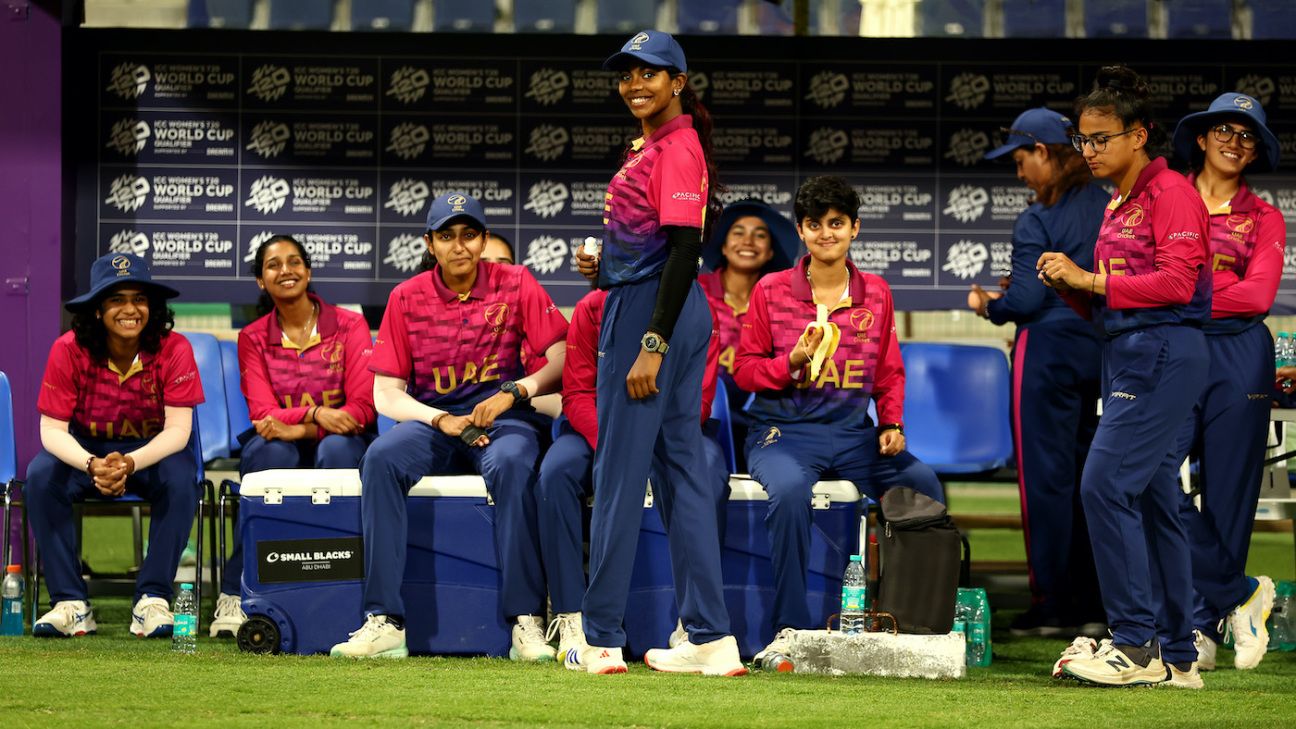Of all the places where the progress of women in society, and by extension in sport, is seen to be worthy of celebrating, the Middle East does not necessarily rank very highly. Except, perhaps, when it comes to cricket in the UAE.
Their women’s team was neither the best-performing Associate over the last year nor did they qualify for the T20 World Cup, but they were given the Associate Women’s Performance of the Year award in the ICC’s Development Awards for 2023 for their stellar run through the T20 World Cup Asia Qualifier. They also show immense potential for the future.
Theirs is a system that is now made up of largely local-born players who are being introduced to the game through a highly professionalised academy system and encouraged to play sport by a generation of parents who understand the importance of physical activity for both genders.
Oza was 15 years old at the time, but she already had a good understanding of team sport and the requisite fitness to play competitive games. She joined the Desert Cubs Academy, where she played mostly with boys but stood out as a strong opening batter and handy offspinner.
A year later she found herself in the national side for a Gulf Cricket Cup (GCC) tournament in “a team made up of schoolgirls”, and had football to thank for some of her successful rise.
“Football is also a team sport, so just being around a team, being around that environment, that’s really important,” she said. “You learn a lot through sports. It teaches you how to deal with a lot of things, be it wins, losses, sharing stuff, talking to different people. That’s something that’s common across all sports. And you’re already active if you’re playing another sport, so it’s easy to transition from one sport to another.”
By then she was 20 and close to the end of her tertiary studies, which is the age at which Raza says most young women are lost to sport. “The challenge comes when they cross the school and university age, where they have to step into the real world and get a job or get married. The challenge for me, or the board, is to keep them in the system,” he said.
Fortunately for Oza, she had both a plan and the right combination of circumstances to help her. In the summer of 2019, she decided to spend an extended period in Mumbai to try to make the domestic Under-23 side there.
The experience itself was more challenging than anything she’d known before. “For the trials, there were more than 5000 girls. Then, it was about getting to the later stages, the top 100 and the last 30 for the camp. That was the first part of the challenge, getting there and making it through these stages,” she said.
She succeeded in earning a place at the Mumbai Cricket Association’s indoor summer camp, which ran for a month, and then the Mumbai senior squad for T20s. “It was a great challenge,” she said. “We had Jemimah Rodrigues playing for Mumbai and she led us in a game. I played against many of the current Indian players as well, and just watching their game, how different it is compared to ours, you can learn a lot from that.”
All the while she was studying towards a bachelor of commerce and management degree from the University of Wollongong. It could all have become too much, but then came Covid-19 and things moved online. “So even though I was in India, I was able to catch up with my classes,” Oza said. “I didn’t miss out on much. I was just trying to balance both things.”
So how did she? “I just put my bat up. I didn’t know what else to do!”
“I really badly wanted to make it to this year’s World Cup,” she said. “But every team wants it. Every team playing the qualifiers has the same goal. The World Cup is the biggest event in the globe for cricketers and I just want to take the team to one, hopefully the 2026 World Cup.”
The 2026 tournament is a slightly expanded version of the competition, with 12 teams instead of ten, and UAE believe they can get there. But along the way, they have other goals. “Becoming one of the best Associate countries in the world is a goal that we are working towards,” Raza said. “And getting ODI status. Those are the things that are on our radar.”
Oza knows that first-hand from the valiant 66 she scored in the T20 World Cup Qualifier against Sri Lanka, which saw her finish as the tournament’s second-highest run-scorer behind Chamari Athapaththu. “It was talked about around the globe,” Raza said, and though Oza is obviously the team’s superstar, he believes there can be others. “Any of our players can have a knock like that or a bowler can have a good spell. And it’s T20 cricket. You never know. You roll one of those big teams over and the whole world will be talking about you.”
His next task is figuring out ways to keep them in the system and there’s no better person to serve as a role model than Oza. “We’re seeing a lot more girls taking part in cricket in the UAE as well,” she said. “We see ten-year-olds coming and saying that they’ve watched us play. They’re watching the UAE women’s team play. That means even they’re keeping their eyes on what’s happening.
“Girls growing up now can have a goal: I want to play for the UAE team in the future. That’s how they can start their journey. They can go to academies and say, ‘In a few years’ time, I want to be a player for the UAE women’s team.'”
Listen to the full interview with Esha Oza and Ahmed Raza on ESPNcricinfo Powerplay on July 17
Firdose Moonda is ESPNcricinfo’s correspondent for South Africa and women’s cricket
